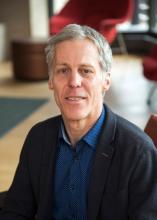Greetings from Carthage College in Kenosha, Wisconsin where I have been teaching all levels of German and Spanish not long after graduating from the Department of Comparative Literature. In the Modern Languages Department, we do not primarily teach literary history or literary scholarship but combine textual comprehension with cultural competency and language proficiency. Skills development culminates in skills integration in our capstone course, an independent research project. Feedback and support during my years as a teaching assistant in the Department of German Studies not only helped me create communicative classrooms but also prepared me for supervising teaching assistants: each year, Carthage College receives one or two teaching assistants from the University of Heidelberg or Leipzig offering first-year German courses. Teaching a German film class in Denny Hall one summer provided a very useful foundation for my general-education course on German cinema.
The liberal arts environment at Carthage College encourages interdisciplinary work, such as offering courses that count for two majors—an upper-division course on society, politics, and the economy in German-speaking countries fulfills an elective in the International Political Economy major—or team teaching. My latest scholarly project grew out of a course on risk and trust taught with a sociologist. I have since explored the role of friendship in “risk society” (Beck), focusing on literary representations of friendship during crises of kin and nation (Kafka, Joyce), war (Bellow), and the avant-garde (Bolaño). At the University of Washington, my exposure to Nietzsche in German Studies and Comparative Literature continues to inspire insofar as my work draws on the philosopher’s associations of friendship with competition and risk.
Since graduating from the University of Washington, my work has been comparatist, whether in my book on the figure of the flaneur in contemporary Spanish literature or in my essays on German exoticism and primitivism. Exploring echoes of Anglophone exoticist texts in German literary exoticism about Oceania, my work has sought to unearth intertextual dimensions of the German discourse of “Ozeanismus.” Studying world literature, theories, and methodologies at the University of Washington also prepared me for contributions to the profession such as serving a five-year term as one of two general editors of Pacific Coast Philology.
